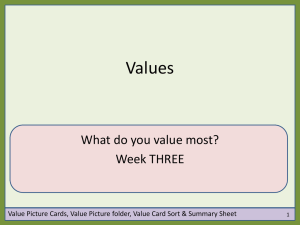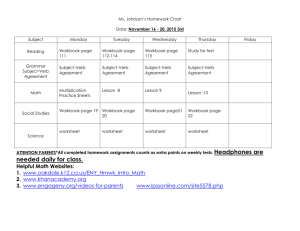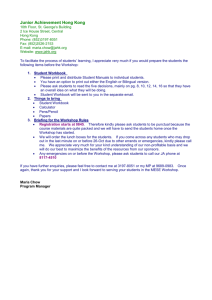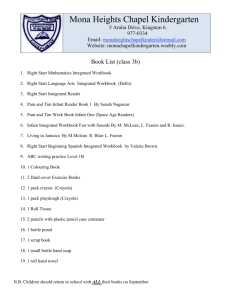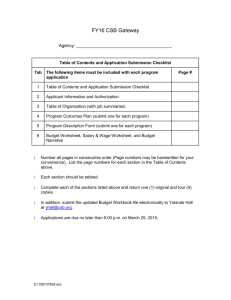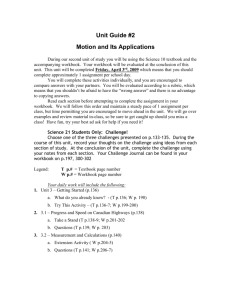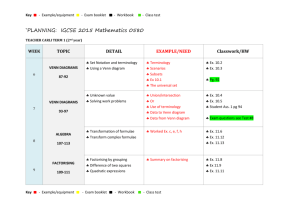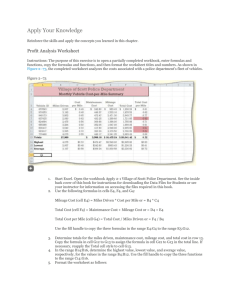Confident Individuals
advertisement
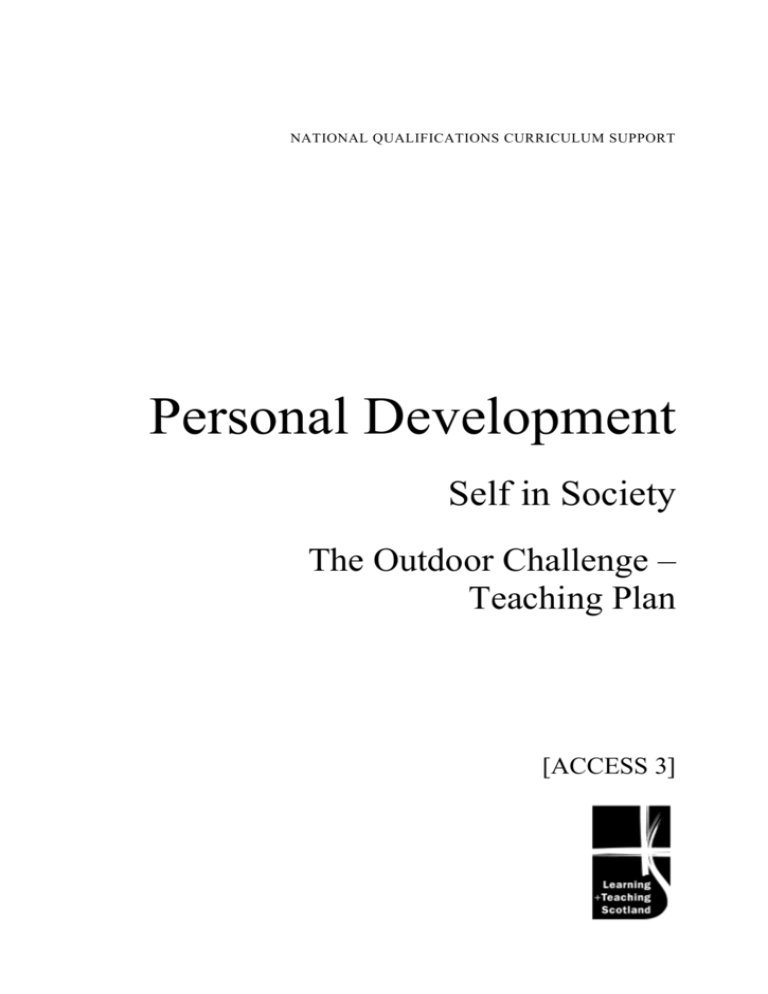
NATIONAL QUALIFICATIONS CURRICULUM SUPPORT Personal Development Self in Society The Outdoor Challenge – Teaching Plan [ACCESS 3] The Scottish Qualifications Authority regularly reviews the arrangements for National Qualifications. Users of all NQ support materials, whether published by Learning and Teaching Scotland or others, are reminded that it is their responsibility to check that the support materials correspond to the requirements of the current arrangements. Acknowledgement Learning and Teaching Scotland gratefully acknowledges this contribution to the National Qualifications support programme for Personal Development. © Learning and Teaching Scotland 2008 This resource may be reproduced in whole or in part for educational purposes by educational establishments in Scotland provided that no profit accrues at any stage. 2 SELF IN SOCIETY (ACCESS 3, PERSONAL DEVELOPMENT) © Learning and Teaching Scotland 2008 Contents Section 1: Introduction 4 Section 2: Teaching plans Introduction Developing interpersonal skills Unit outcomes Learning outcome 1: Self evaluation Learning outcome 2: Personal development planning Planning the challenge Learning outcome 3: Get involved in doing the project Learning outcome 4: Review of progress and skills Re-visiting interpersonal skills SELF IN SOCIETY (ACCESS 3, PERSONAL DEVELOPMENT) © Learning and Teaching Scotland 2008 8 9 10 11 12 13 15 16 17 3 INTRODUCTION Section 1: Introduction The Personal Development: Self in Society unit challenge takes place within the context of Outdoor Education and is part of a set of units that build to a rounded outdoor experience. Special requirements In order to deliver the challenge activity part of the Self in Society unit, the instructor/teacher must be qualified to National Governing Body standards and at a level appropriate to the activity or range of activities. Risk assessment, health and safety, and appropriate policies and procedures must be in place and adhered to. Guidance on these aspects can be accessed in the Scottish Government’s Health and Safety on Educational Excursions pack, particularly ‘Supplement 1: Standards for Local Authorities in Overseeing Educational Excursions’, and ‘Supplement 3: A Handbook for Group Leaders’. These can be downloaded from the Scottish Government’s website. http://www.scotland.gov.uk Support and expertise Some local authorities have their own outdoor service, while others link with neighbouring authority service or use external providers. Practitioners should begin by consulting with their own Education Department and, where possible, the Outdoor Education Advisor. The Self in Society unit In the Self in Society unit, personal development is achieved by setting targets within a challenge based project aimed at improving interpersonal skills. The challenge also provides a rounded experience where young people identify, plan, develop and evaluate the impact of the challenge as part of their socio-environmental education. This builds self-confidence, self-reliance and skills of co-operation and working with others. 4 SELF IN SOCIETY (ACCESS 3, PERSONAL DEVELOPMENT) © Learning and Teaching Scotland 2008 INTRODUCTION It is envisaged that young people will require directive support by means of explicit instruction given by the instructor/teacher as they progress through the unit. However, opportunities for peer interaction and interpretive responses should be sought and rewarded whenever possible. Course materials The course materials take the form of a set of teaching plans and a student workbook. References to definitions, websites and other helpful contacts can be found at the back of the pupil workbook. Outcomes The outcomes for the Self in Society unit are as follows: 1. Evaluate own interpersonal skills in preparation for a group project. 2. Participate in the planning of a group project which allows progress towards personal targets. 3. Participate in the planned group project. 4. Review own interpersonal skills on completion of the project. Evidence requirements The ‘Pupil Workbook’ is designed around SQA evidence requirements and provides a complete evidence format for Personal Development: Self in Society at Access 3 level. However, greater variety in the range of evidence gathered can easily be applied using the paper base for structuring responses, such as via email, blogs, video, photography or podcasts. Detailed advice about outcomes can be found in the Scottish Qualifications Authority (SQA) National Unit Specification guidance. In addition, SQA National Assessment Bank Materials are available on the SQA website. Quality assurance Establishments should retain assessment evidence and internal verification records. Units are subject to external verification by SQA. SELF IN SOCIETY (ACCESS 3, PERSONAL DEVELOPMENT) © Learning and Teaching Scotland 2008 5 INTRODUCTION Reassessment Time is allowed within units for assessment and re-assessment of outcomes. Where learners or young people have not attained the standard necessary to achieve a particular outcome or outcomes, they should have the opportunity to be reassessed. There should normally be one unit reassessment opportunity, or in exceptional circumstances two. In some cases learners or young people will be required to resubmit original work which has been revised to take account of earlier weaknesses. In other cases, learners or young people will be required to undertake a new Instrument of Assessment designed to assess the particular outcome(s) in which they were unsuccessful. In all cases, evidence from the original assessment should be used for formative purposes prior to reassessment Curriculum for Excellence Within the context of Taking Learning Outdoors: partnerships for excellence, there is growing evidence that: ‘Outdoor learning can contribute significantly to the educa tion and personal development of children and young people and enable them to embrace the challenges of the future.’ Outdoor Education, using Curriculum for Excellence to inform personal development, embraces the future challenges young people face throug h the major themes of: sustainable living and working health and wellbeing experiential learning. By growing in confidence through this form of active engagement with an instructor in a mentoring or coaching situation, young people experience first hand the potential for self-improvement and are exposed to becoming responsible citizens and effective contributors. Peer assessment by a ‘critical friend’ also engages learners in positive relationship learning. 6 SELF IN SOCIETY (ACCESS 3, PERSONAL DEVELOPMENT) © Learning and Teaching Scotland 2008 INTRODUCTION By completing this unit, learners have the opportunities to develop as: Effective Contributors Confident Individuals With: Improved interpersonal skills Knowledge and experience of the wider environment Sound environmental practices and principles Ability to better act on socioenvironmental issues Basic skills of co-operation and working with others Enterprising approaches to social issues Where: Practical achievement underpins confidence and self-esteem is raised Reflective self-assessment, improved self-image and potential for fitness raising is enhanced Improved personal effectiveness and coping strategies Potential for greater independence/ control over aspects of their socioenvironmental perspective can be achieved Attitudes, beliefs and selfperception are enhanced Positive behaviour is established Successful Learners Responsible Citizens Developing: ICT skills Knowledge and skills that add value to classroom experiences Core Skills in Problem Solving Improved literacy, numeracy and communication skills The ability to listen and follow instructions A range of technical/ environmental terminology Engagement and stronger motivation to learn Who: Share their experiences with others Learn about ‘green’ methods of travel Appreciate job roles in the context of outdoor activity Develop values – caring for needs of others, the need for ‘standards’ in society, peer mediation, instructor-pupil interaction With support, plan, do, review and evaluate tasks within a socioenvironmental context SELF IN SOCIETY (ACCESS 3, PERSONAL DEVELOPMENT) © Learning and Teaching Scotland 2008 7 TEACHING PLANS Section 2 Introduction Learning outcomes Activity Methodology Relevant pages in booklet Resources Assessment Introduction to the Personal Development: Self in Society Unit and to the key themes of: Teacher-led discussion 4–6 Workbook Verbal feedback Teacher-led 7–22 Overview of worksheets Verbal feedback A young person should: understand the demands of Personal Development: Self in Society Unit developing interpersonal skills be aware of the expectations of both the outdoor challenge and the development of Interpersonal Skills be aware of the evidence base incorporated into the workbook. 8 planning a group project carrying out the project reviewing skills and progress Introduce group to workbook evidence base (worksheets). SELF IN SOCIETY (ACCESS 3, PERSONAL DEVELOPMENT) © Learning and Teaching Scotland 2008 TEACHING PLANS Introduction: Developing interpersonal skills Activity Methodology Relevant pages in booklet Resources Teacher defines what a skill is and that it can be developed with support. Teacher led 5 Workbook identify three skills Complete task 1. Paired/Group task 5 Workbook Feedback of identified skills understand what interpersonal skills are and be able to identify two such skills Introduce definition of interpersonal skills and examples. Teacher led 5 Workbook Feedback on interpersonal skills. be able to talk about and identify interpersonal skills in the context of group interactions/ instructor’s job role. Act out typical outdoor scenes and discuss the issues arising. Role-play activity and completion of group tasks 2 and 3. 5–6 Workbook; flipchart, markers Pupil responses to role-play and tasks; questioning to elicit knowledge and understanding. Learning outcomes Assessment A young person should: understand what a skill is be aware that skills can be developed Complete tasks and generate lists of interpersonal skills. SELF IN SOCIETY (ACCESS 3, PERSONAL DEVELOPMENT) © Learning and Teaching Scotland 2008 9 TEACHING PLANS Introduction: Unit outcomes Learning outcomes Activity Methodology Introduce the four Learning Outcomes. Teacher-led introduction/discussion Relevant pages in booklet Resources 7 Workbook A young person should: 10 be able to identify the four key learning outcomes and know where to look for them in the workbook. SELF IN SOCIETY (ACCESS 3, PERSONAL DEVELOPMENT) © Learning and Teaching Scotland 2008 Assessment TEACHING PLANS Learning outcome 1: Self evaluation Learning outcomes Activity Methodology Relevant pages in booklet Resources Assessment A young person will: know what his/her strengths and weaknesses are in relation to the key and additional interpersonal skills. Evaluate the strengths and weaknesses of pupil’s interpersonal skills. Discussion and personal response to worksheet. 8 Workbook (worksheet) Discussion and mediated comments on worksheet. identify two targets for development of interpersonal skills. Young person to complete the ‘Your targets’ worksheet. Introduce worksheet. 9 Workbook (worksheet) Comment on worksheet. SELF IN SOCIETY (ACCESS 3, PERSONAL DEVELOPMENT) © Learning and Teaching Scotland 2008 11 TEACHING PLANS Learning outcome 2: Personal development planning Learning outcomes Relevant pages in booklet Resources Assessment Teacher-led introduction. 9–11 Workbook Evaluation of task development. Peer/teacher mediation of plan. 9–11 Workbook Evaluation of task development and peer input. Activity Methodology Young people to be introduced to and complete a personal development plan. Peers to agree and sign off the plan and teacher to countersign. A young person will: 12 be clear about their tasks and about how they will help them to achieve their targets for the development of interpersonal skills. SELF IN SOCIETY (ACCESS 3, PERSONAL DEVELOPMENT) © Learning and Teaching Scotland 2008 TEACHING PLANS Learning outcome 2: Planning the challenge Activity Methodology Relevant pages in booklet identify outdoor challenges Thought-shower ideas about outdoor challenge. List on a flipchart. Group activity. research various outdoor organisation websites and arrange a visit to an outdoor organisation. Young people to use internet, email and/ or telephone services to arrange visits to organisations that face outdoor challenges, such as the National Park Ranger Service and the Forestry Commission. Find out and experience what they do. Learning outcomes Resources Assessment 12 Workbook; flip chart, pens List information and pupil input to development of list. Group research and arrange fact-finding visit (but instructor should have preplanned the engagement with the organisation). 12, 23– 24 Internet, email, telephone, notepads, pens Evaluate success of visit/arrangement. The group chooses a challenge from the challenge list. Group activity. 12 Workbook; challenge list Evaluation of group interaction. Introduce the notion of a ‘spider’s web’ of information/ ideas around typical challenges. Teacher-led development 12–13, 23–24 Flip chart, pens, internet, email, telephone Pupil understanding and contribution of ideas. A young person can: understand the idea of a web of ideas and information around a topic or challenge Use the worked example of the ‘biodiversity’ web, a definition of which, and related website references, can be found in the pupil workbook. SELF IN SOCIETY (ACCESS 3, PERSONAL DEVELOPMENT) © Learning and Teaching Scotland 2008 13 TEACHING PLANS Learning outcome 2: Planning the challenge (continued) Learning outcomes Activity Methodology Relevant pages in booklet Resources Assessment A young person will: actively use the ‘spider’s web’ technique. Group works to develop its own ‘spider’s web’ around its chosen challenge. Teacher-supported development. Some further research may be required of young people. 12–13 Workbook, internet, email, telephone Group development of ‘web’ – individual input sought/monitored. understand action planning and experience the transfer of ideas between the planning formats. The group develops, along with the instructor, a group action plan based upon the ideas and links flowing from the ‘spider’s web’. Teacher-led development 14–16 Workbook Evaluate pupil inputs into group action plan. understand his/her role through the development of the challenge activity programme with its planned learning intentions. Development of challenge activities programme based on information from the action plan. Teacher-led discussion and development. 16–18 Workbook Evaluate outcome of learning intention planning. 14 SELF IN SOCIETY (ACCESS 3, PERSONAL DEVELOPMENT) © Learning and Teaching Scotland 2008 TEACHING PLANS Learning outcome 3: Get involved in doing the project Learning outcomes Activity Methodology Relevant pages in booklet Resources Assessment A young person will: play a role based on their understanding of the programme learning intentions Work from the challenge activity programme to create a role through learning intention generation for each section of the challenge (such as each week or activity date). Young person completes each section of the challenge under the guidance of the instructor. 16–17 Workbook, camera Evaluation of learning log, photo log. evaluate learning and progress with skills. Completion of learning log or photo log sheet at end of each day. Evidence generation and pupil evaluation of progress and personal development. 17–18 Workbook, camera Evaluation of learning log, photo log. SELF IN SOCIETY (ACCESS 3, PERSONAL DEVELOPMENT) © Learning and Teaching Scotland 2008 15 TEACHING PLANS Learning outcome 4: Review of progress and skills Learning outcomes Activity Methodology Relevant pages in booklet Resources Assessment The young person: examines and reviews the progress of the group and his/her own role within the group. Young people complete the challenge review sheet; the instructor comments on progress, signs and dates the worksheets. Young people complete the challenge review sheet under advice/guidance of instructor/teacher. 19 Workbook Evaluate response to worksheet. Peer evaluates progress on targets and on co-operation with others. Go through the statements on the review of targets and cooperation with others worksheet and allow peer discussion on attainment of each skill area. Peer discussion on each skill area of worksheet overseen by instructor/teacher. 20 Workbook Evaluate response to worksheet and peer discussion. Individuals should complete each statement response in line with the peer discussion. 16 A member of the peer group should also comment on the worksheet (the comment should represent the views of the group). Peer comment. Instructor should check and sign off the completed worksheet. Teacher signs off completed worksheet. SELF IN SOCIETY (ACCESS 3, PERSONAL DEVELOPMENT) © Learning and Teaching Scotland 2008 TEACHING PLANS Learning outcome 4: Re-visiting interpersonal skills Learning outcomes Activity Methodology Relevant pages in booklet Resources Assessment A young person will: evaluate their interpersonal skills by asking ‘How am I doing now?’ Complete the interpersonal skills ‘scaling’ pro-forma. Pupil evaluation 21 Workbook Outcome of evaluation: strengths and weaknesses and comparison with previous scoring (at start of challenge). predict and set future skill requirements. Choose targets for future skills development. Discussion/Pupil choice 22 Workbook Worksheet response. SELF IN SOCIETY (ACCESS 3, PERSONAL DEVELOPMENT) © Learning and Teaching Scotland 2008 17
